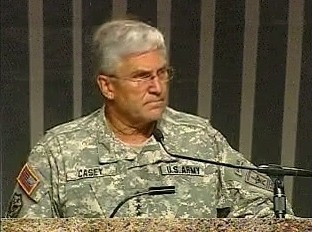WASHINGTON (Army News Service, Oct. 10, 2007) - In his keynote address at the Association of the United States Army Annual Meeting's Eisenhower Luncheon, Gen. George W. Casey Jr., chief of staff of the Army, said he foresees decades of persistent conflict, but expects the Army to rise to the challenge.
Terrorists, he said, will continue to attack America, and the Army will remain central in defending our values and way of life.
"We will be unlikely to predict the time, location or the scope of coming conflicts, and looking back over history, the one thing we know when it comes to predicting the future is that we usually get it wrong," he said. "The Army has a vision to build those forces and we're already executing it. We intend to transform the current force into a campaign-quality, expeditionary Army capable of supporting our commanders across the spectrum of conflict of the 21st century. We're about half-way there in completing the transformation of our force."
He said it is still the best Army in the world, but he acknowledged it is stressed and stretched by six years of war.
"Today's Army is out-of-balance," said Gen. Casey. "The current demand on our forces exceeds the sustainable supply. We are consumed with meeting the demands of the current fight and unable to provide ready forces as rapidly as we would like for other contingencies. Overall, we are consuming our readiness as fast as we are building it."
According to Gen. Casey, four imperatives will rebalance the force.
First, the Army must improve sustainment, not only by recruiting, retaining and training Soldiers, but especially by caring for their Families and for wounded warriors. Gen. Casey also pointed out that Army Civilians are an important part of the force.
"Our warriors are our ultimate asymmetric advantage, the one thing that no enemy can duplicate now or in the future and we need to keep them with us," he said. "We're committed to ensuring that the quality of life of our Soldiers, Families and Civilians is commensurate with their magnificent service."
His second imperative was preparation for success. The Army, he said, is committed to providing Soldiers with the best-possible equipment so they can maintain the advantage over the enemy, as well as intensive training opportunities.
An important part of preparation is Gen. Casey's third imperative: reset. He stressed the importance of giving Soldiers and their Families the time and opportunity to recover from repeated deployments. He also mentioned that since 2003, equipment has been used at over five times its normal rate and in harsh environments. He cautioned that reset must last several years after deployments end.
The final imperative is transforming the Army to meet the demands of the 21st century. According to Gen. Casey, transformation is a holistic effort encompassing how the Army fights, trains, modernizes, develops leaders, bases forces and supports Soldiers, Families and Civilians.
It includes growing and modernizing the Army, developing agile, adaptive leaders and especially adapting the Reserve Components, which Gen. Casey said are "performing magnificently, but in an operational roll for which they were neither designed nor resourced.
"They are no longer a strategic reserve mobilized only in national emergencies," he said. "They are now an operational reserve, deployed on a cyclical basis to allow us to sustain extended operations. Operationalizing the Reserve Components will require national and state consensus as well as continued commitment from employers, Soldiers and Families. It will require changes to the way we train and equip, resource and mobilize, and also administrative policies. We owe it to them to make this transition rapidly."
Gen. Casey remained hopeful, however, reminding the audience that the Army has faced and overcome challenges for 232 years, bringing strength and freedom to the nation and the world.
"Soldiers are the strength of this Army and they make this Army the strength of this nation. It will be our Soldiers who lead us to victory over the nation's enemies and it will be our Soldiers who preserve the peace for us and for our allies. Our combat veterans know well the meaning of Army strong. Baptized in fire and blood, they've come out steel and that steel endures," he said.


Social Sharing